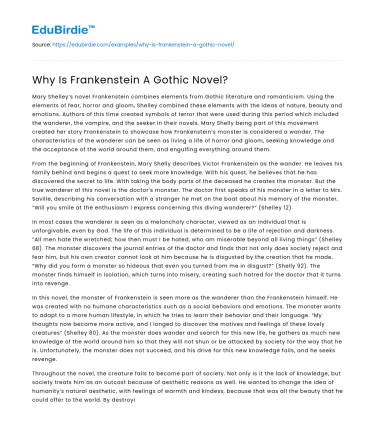Mary Shelley’s novel Frankenstein combines elements from Gothic literature and romanticism. Using the elements of fear, horror and gloom, Shelley combined these elements with the ideas of nature, beauty and emotions. Authors of this time created symbols of terror that were used during this period which included the wanderer, the vampire, and the seeker in their novels. Mary Shelly being part of this movement created her story Frankenstein to showcase how Frankenstein’s monster is considered a wander. The characteristics of the wanderer can be seen as living a life of horror and gloom, seeking knowledge and the acceptance of the world around them, and engulfing everything around them.
From the beginning of Frankenstein, Mary Shelly describes Victor Frankenstein as the wander. He leaves his family behind and begins a quest to seek more knowledge. With his quest, he believes that he has discovered the secret to life. With taking the body parts of the deceased he creates the monster. But the true wanderer of this novel is the doctor’s monster. The doctor first speaks of his monster in a letter to Mrs. Saville, describing his conversation with a stranger he met on the boat about his memory of the monster, “Will you smile at the enthusiasm I express concerning this diving wanderer?” (Shelley 12).
Save your time!
We can take care of your essay
- Proper editing and formatting
- Free revision, title page, and bibliography
- Flexible prices and money-back guarantee
In most cases the wanderer is seen as a melancholy character, viewed as an individual that is unforgivable, even by God. The life of this individual is determined to be a life of rejection and darkness. “All men hate the wretched; how then must I be hated, who am miserable beyond all living things” (Shelley 68). The monster discovers the journal entries of the doctor and finds that not only does society reject and fear him, but his own creator cannot look at him because he is disgusted by the creation that he made. “Why did you form a monster so hideous that even you turned from me in disgust?” (Shelly 92). The monster finds himself in isolation, which turns into misery, creating such hatred for the doctor that it turns into revenge.
In this novel, the monster of Frankenstein is seen more as the wanderer than the Frankenstein himself. He was created with no humane characteristics such as a social behaviors and emotions. The monster wants to adapt to a more human lifestyle, in which he tries to learn their behavior and their language. “My thoughts now became more active, and I longed to discover the motives and feelings of these lovely creatures” (Shelley 80). As the monster does wander and search for this new life, he gathers as much new knowledge of the world around him so that they will not shun or be attacked by society for the way that he is. Unfortunately, the monster does not succeed, and his drive for this new knowledge fails, and he seeks revenge.
Throughout the novel, the creature fails to become part of society. Not only is it the lack of knowledge, but society treats him as an outcast because of aesthetic reasons as well. He wanted to change the idea of humanity’s natural aesthetic, with feelings of warmth and kindess, because that was all the beauty that he could offer to the world. By destroying the innocence of the monster., he goes down the path of destruction and revenge. “For the first time the feelings of revenge and hatred filled my bosom, and I did not strive to control them” (Shelley 99).
Doctor Frankenstein, a wanderer that is seeking the knowledge above everyone else, creates a monster without considering the consequences of his actions. This new creation carries the same characteristics of the doctor. The monster is rational and relies on impulses which leads him to commit acts of violence and destruction to the world around him.
The monster of Frankenstein is characterized as a wanderer in Gothic literature. Created by Frankenstein to show that old and new science can be used to create life. The monster created by using the limbs of deceased people, is left to find place in society. On his journey to seek knowledge, this monster of darkness, surrounded by the actions of destruction and revenge, is cast out of society because he distorts the whole of nature.






 Stuck on your essay?
Stuck on your essay?

